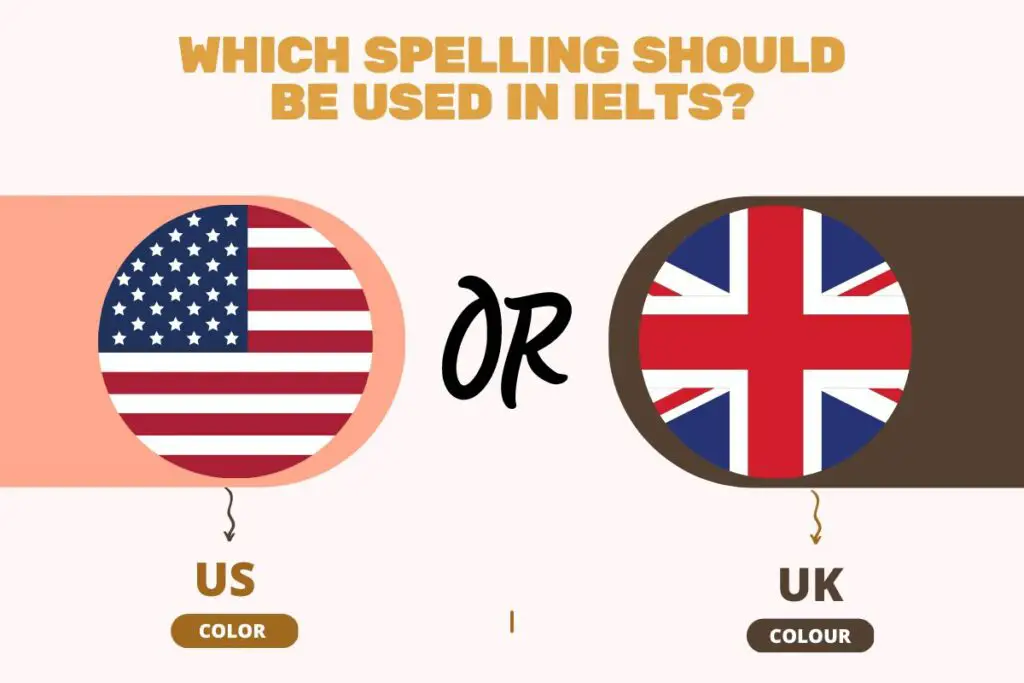Correctly spelling the words you write is important when taking the IELTS exams. Since there are two sets of spelling commonly used in the English language, American and British spelling, you may have doubts regarding which one to prefer.
Based on their knowledge, candidates taking the exam can choose between US and UK spelling. The exam board accepts both spelling forms, so you can use whichever one you prefer.

For improved performance in the examination, it’s important to understand the UK and US spellings along with the necessary tactics to spell better.
What are the differences between us and UK spelling?
The key distinction is that British English retains the spelling of words borrowed from other languages, primarily French and German. While American English spellings are primarily determined by how the word sounds when spoken.
Look at the table below and observe the spelling differences between British and American for common words you might encounter in your IELTS exam:
| British Spelling | American Spelling |
|---|---|
| Colour | color |
| flavour | flavor |
| humour | humor |
| labour | labor |
| neighbour | neighbor |
| apologise | apologize |
| organise | organize |
| recognise | recognize |
| analyse | analyze |
| Travelling | traveling |
| defence | defense |
| licence | license |
| offence | offense |
| dialogue | dialog |
| instil | instill |
| enrol | enroll |
| tonne | ton |
| centre | cente |
| fibre | fiber |
| theatre | theater |
| aeroplane | airplane |
| cosy | cozy |
Do you want to learn more words with different spellings in the UK and the US?Go to the http://www.tysto.com/uk-us-spelling-list.html
Can I simultaneously use both us and uk spellings?
It is not advisable for you to use both of these English forms for your IELTS exam. This is due to the fact that both American and British English are regarded as distinct versions of the language. Throughout the exam, you should stick to spelling words in either British or American English.
The examiner will make a decision and consider your work in the British language as soon as you write British Spelling. For instance, if you write ‘enroll’ in American English, stick with it and use American vocabularies for the rest of the words you use. Later in the exam, do not use the word ‘enrol’ or any other British vocabulary. The examiner will consider this a spelling error, and you will lose scores for Lexical Resources.
Does spellings matter in IELTS?
Spellings are definitely of critical importance in the Listening , Reading and Writing module. For the Listening module, each right answer carries one mark. And even a simple spelling error will cause your answer to be incorrect.
For the reading module, all the required spellings will be mentioned in the reading passages itself. You must only copy the exact word as it appears in the passage and write it in the designated space. However, be careful to spell correctly, as there is a chance that you will make mistakes when writing your fair answers in the answer script. Spelling is also very important in the IELTS writing module. More spelling errors will disrupt the flow of your answer and result in lower writing scores.
How to improve my spelling in IELTS?
As spellings play a vital part in IELTS, it’s important to formulate plans to learn and improve your spelling skills. The following tips will aid you in better your spelling skills:
- Make a list of spellings where you constantly make mistakes, as well as tricky words you don’t know how to spell. Referring to this note and adding new words on a regular basis will improve your spelling.
- Learning by heart is the simplest and most effective way to ensure that you have mastered the spellings. The most efficient method for byhearting is to write the spellings.
- It’s a tough call to learn all the spelling rules as it’s easy for you to get lost and confused in a whirlwind of it. It is preferable to learn the spellings of individual words as you come across them.
- Install a dictionary app on your smartphone. When you look up the meaning of new words, you can also learn how to pronounce and spell them. Knowing the actual pronunciation can help you remember the correct spelling to a certain extent. The Merriam-Webster dictionary and the Oxford English dictionary apps are good choices.
- Turn off all automatic correction functions if you are used to typing your answers so that you can identify and learn the misspelt words ( best method if you are attempting computer-based IELTS)
- Reading more books will help you improve your sense of recognising whether a word is spelled correctly, as well as your vocabulary and comprehension.
- Take online spelling tests to put your knowledge to the test. They are mostly free and will boost your confidence while also assisting you in determining which words you should continue to focus on learning the spelling of.
How many spelling mistakes are allowed in IELTS writing?
Spelling errors in your writing tasks will be tolerated to a certain extent. The more spelling errors you make, the lower your band score will be. A few spelling or word formation errors will not cause you to lose points because IELTS considers them’slips.’ Slips occur when one or two errors in your answer do not affect the overall structure and meaning of your response.
If you spelled ‘SUCESS’ instead of ‘SUCCESS,’ the examiner may interpret it as a typing error or an error made while writing quickly. However, if the same error is made more than once, the examiner concludes that you do not know how to spell the word correctly, resulting in a lower score.
If you need a band 8, you can have one or two spelling errors at most and no other errors at all. For band 7, minor spelling and word formation errors will be considered. If you receive a Band 6 score, it means that you made consistent and frequent spelling errors but they did not completely disrupt the flow of your writing. In order to receive a Band 5, a candidate must have made nearly a 50% error in spelling and word formation in their total answering.
What are some of the common spelling errors made in IELTS?
Recognize where you frequently make mistakes to improve your spelling skills. Knowing the most common types of words where you make spelling errors will help you learn them and write error-free the next time.
1. Single/ double Letters
This is the most common mistake that students make when adding or deleting letters from the original spelling, resulting in incorrect spelling.
Eg: acommodation❌ Accommodation ✔️
2. Silent Letters
Words with silent letters are the most difficult to spell because when you say them, the particular letter is silent, but it is part of the spelling.
Eg: plumer ❌ Plumber ✔️
3. ‘i’ and ‘e’ position words
This is another difficult aspect of learning spellings because it is easy to swap the order of the I and e in a word, resulting in a misspelt word.
Eg: recieve ❌ receive ✔️
4. The ‘or’ , ‘er’ dilemma
Another spelling issue that students face is when they are unsure about the endings of words with or and er and misspell them.
Eg: travellor ❌ traveller ✔️
5. Similar sounding words
Some English words sound almost identical, but their spelling and meaning are as dissimilar as chalk and cheese.
Eg: accept/ except
Accept: consent to receive or undertake (something)
[ eg: i accept your proposal.]
Except : not including; other than.
[ eg: they asked everyone to come for the party except me.]
How can I make fewer spelling errors in the Writing section?
Double-checking your answer at the end of the exam is extremely important and can help you correct many spelling mistakes. Always set aside two to three minutes at the end of your task to proofread your response for spelling, word formation, and other errors.
Another method is to keep track of the common errors you make. Mark these words and check whether you make the same spelling mistake in subsequent writings. If so, make an extra effort to learn it thoroughly. Making an IELTS-related vocabulary list during your exam preparations will greatly assist you in learning many words and their spellings. Because you are already familiar with them, your chances of making spelling mistakes are greatly reduced.
What are some of the most common misspelled words in IELTS?
Each candidate makes a widely differing number of spelling errors. These spelling errors will cost you a great deal if you want to score higher in the IELTS exam. Let’s look at some commonly misspelt words and learn how to spell them correctly:
| Convenient ✔️ | convineant ❌ |
| Accurate ✔️ | acurrate❌ |
| Pronunciation ✔️ | pronounciation❌ |
| Rhythm ✔️ | rhytham ❌ |
| Accommodation ✔️ | accomodation ❌ |
| Deteriorate ✔️ | deteriarate❌ |
| Committe ✔️ | comittee ❌ |
| Guarantee ✔️ | garantee ❌ |
| Successive ✔️ | sucessive ❌ |
| Beginning ✔️ | begining❌ |
| Persuade ✔️ | persuaide ❌ |
| Describe ✔️ | discribe ❌ |
| Definitely ✔️ | definately❌ |
CONCLUSION
Using the correct spellings is critical to ensuring error-free writing, and remember to use either British English or American English spelling throughout your writing. If you combined them up, your scores would suffer greatly.
